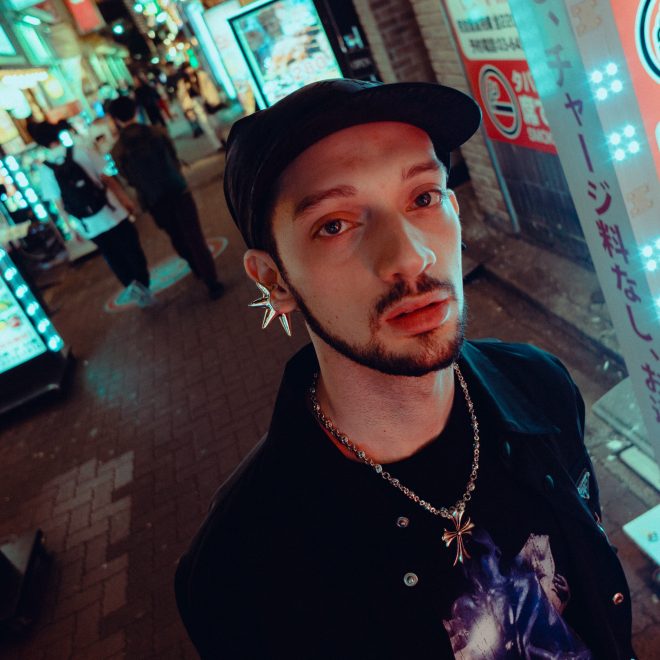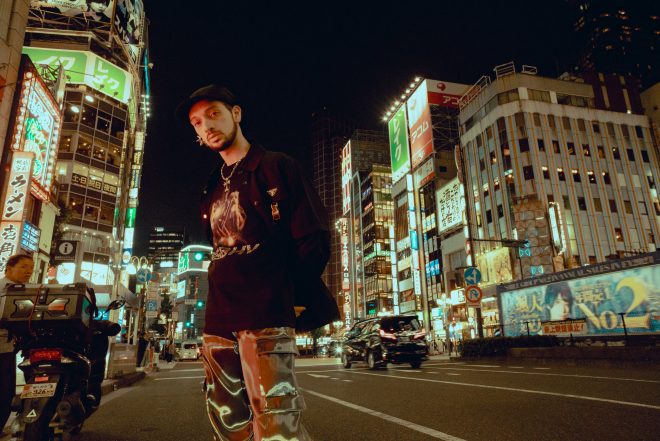Interview: Maike Depas dives into “Sound of nothingness”

Few artists in the hard techno landscape are navigating silence with as much precision and purpose as Maike Depas. With his latest EP Sound of Nothingness, the Italian producer invites listeners into a paradoxical space — one where absence becomes presence, stillness becomes tension, and sound becomes a philosophical inquiry. More than a release, this project feels like a ritual: four tracks designed not to overwhelm the listener, but to awaken something deeper within them.
In this exclusive interview, Depas opens up about the conceptual backbone of the EP — a descent not into chaos, but into clarity. He speaks of “nothingness” not as a void, but as a space of potential: the moment before ego intervenes, before genre expectations take hold, before the drop. Through this lens, techno becomes less about escapism and more about confrontation — with silence, identity, and the unknown.

“Sound of Nothingness” is an evocative title, almost paradoxical. What does ‘nothingness’ mean to you in the context of sound, identity, and creation? Is this EP a confrontation with silence, ego, or something more existential in your artistic journey?
“Nothingness” is a space I constantly return to when I create. It’s the place before thought, before ego, where only instinct speaks. In sound, it manifests as tension, the moments between the beats, the reverb tails, the absence that gives shape to presence.
For me this EP is about what silence reveals when you're not afraid to face it. It's where identity starts to dissolve and something more essential takes over. I wanted to build an emotional architecture using techno as the raw material, a kind of sonic void where you can lose yourself and maybe find something deeper.
Sound Of Nothingness is both a rebellion and a surrender. A rebellion against the noise of expectations, and a surrender to the unknown. It’s not meant to give answers, but to open space.
The vocal line “I’m just creating space for what is still to come” hits like a mantra, ominous, yet strangely hopeful. Where did that phrase originate, and how does it reflect your current state of mind as an artist pushing boundaries in a genre that thrives on extremes?
That line came from a moment of clarity during a late-night writing session. I was going through a phase of transition, both creatively and personally, and I felt the need to stop filling every silence, every gap, with noise or certainty.
“Creating space” became my way of letting go, of trusting the unknown instead of forcing outcomes. It’s hopeful because it embraces change, but there’s tension too, because waiting in silence isn’t always comfortable.
As an artist, I don’t want to just follow the extremes of the genre, I want to reshape them. This phrase reminds me to stay open and unfinished, because that’s where the most powerful ideas are born.

Tham’s remix of the title track feels like an act of sonic alchemy, stripping the original down to its primal essence and re-forging it into a club weapon. Why did you choose Tham specifically, and what do you think his version reveals about the track’s darker undercurrent?
Tham was the first name that came to mind. His sound has a raw, hypnotic power that I deeply respect, it’s emotional, but never overworked. I knew he’d go straight to the core of the track.
What he delivered is exactly what I hoped for: a version that pushes the energy forward while exposing a darker, more physical layer that was hidden in the original.
His remix turns introspection into propulsion. It shows that even something born from silence can evolve into something intense, driving, and alive on a dancefloor.
There’s a clear escalation across the four tracks, from the driving hypnosis of Sound of Nothingness to the brutalist energy of Think of Me. Was this EP designed as a psychological descent? What emotional or spatial experience were you hoping to construct for the listener?
Yes, the EP follows a very deliberate arc, but more than a descent, I see it as a form of inner excavation. Each track moves deeper, stripping away layers until what’s left is pure instinct and emotion.
Going Back is a turning point for me. It holds so many sonic elements I’ve carried with me over the years, textures, harmonics, energy, but shaped through who I am now. That track connects my current sound identity with the artist I used to be. It’s nostalgic, but forward-looking.
The EP starts in reflection, grows in pressure, and ends in release. I wanted to create a space that feels both intimate and intense, a mental and physical journey where the listener meets something real inside themselves.
Hard techno in 2025 is saturated, fast, and often formulaic. Yet your sound remains sharp, structured, and compositionally rich. How do you resist the genre’s temptations to flatten or conform, and what does innovation look like for you when everyone’s trying to be the loudest in the room?
I don’t see the point in being the loudest if you’re not saying anything. Speed and distortion alone don’t move me, emotion does.
I come from a background where composition matters. I approach every track like a piece of architecture: there has to be tension, release, and depth. Even when it’s hard and driving, it needs to breathe.
Innovation, for me, is about contrast. It’s about putting something human inside the machine. That could be a chord that feels out of place, a voice that cuts through the noise, or a silence that says more than the kick.
I stay grounded by focusing on the ‘why’ behind every sound. That’s how I avoid falling into formulas, by remembering that I’m not here to follow trends. I’m here to leave a mark.

Your work has often flirted with dystopian and cyberpunk aesthetics, not just in sound, but visually. How do these elements of sci-fi and future-collapse culture bleed into the sonic DNA of Sound of Nothingness? Are you soundtracking a world that’s falling apart, or one being rebuilt?
To me, dystopia isn’t just destruction, it’s transformation. I’m not interested in soundtracking collapse for the sake of it. I’m more drawn to what comes after: the reconstruction, the resistance, the rebirth.
Sci-fi and cyberpunk influence me because they show fractured systems, but also individuals trying to break free from them. That energy, of isolation, rebellion, and fragile hope, is central to Sound of Nothingness EP.
The sonic choices reflect that tension: mechanical textures meet emotional motifs, precision meets chaos. It’s not a clean future. It’s unstable, vulnerable, but still alive. So no, I’m not documenting the end. I’m imagining what it sounds like to survive it and start over, in sound, in identity, in everything.
Releasing through your own label, The Innovation Studio Records, gives you full creative autonomy. How crucial is that freedom when constructing uncompromising projects like this? And what role do you see your label playing in shaping the future of hard techno?
Creative freedom is everything. Without it, this EP wouldn’t exist. Sound of Nothingness needed space, not just in the music, but in the process: no pressure to fit trends, no compromises on structure or length. That kind of control allows me to be fully honest in what I release.
The Innovation Studio Records was born from that mindset, a place where sound isn’t just functional, but meaningful. My goal with the label isn’t just to put out tracks that work in clubs. It’s to support artists who treat techno as an art form, not a formula.
I see the label as a creative lab, somewhere experimentation is not just allowed, but expected. If we want the future of hard techno to evolve, we need spaces where risk and identity matter more than algorithms.
When you close your eyes and envision Sound of Nothingness in the wild, on a warehouse system, in a Berlin bunker, or deep inside someone’s headphones, what space do you want it to occupy? Is this music for collective exorcism, introspection, rebellion… or all of the above?
All of the above, and more. I want this music to live wherever someone needs it. Whether it’s exploding through a warehouse system or whispering in a pair of headphones at 3am, it should trigger something real.
For some, it might feel like a release. For others, like a confrontation. Maybe even a reset. The space doesn’t matter as much as the impact: I want it to shake something loose.
Sound of Nothingness EP is designed to travel through different states of mind. That’s the power of this kind of music: it doesn’t just fill space. It opens it.
In a scene driven by volume and velocity, Sound of Nothingness stands as a rare moment of pause—a bold reminder that silence, intention, and emotional depth still have a place on the dance floor. With this EP, Maike Depas doesn’t just push boundaries — he dissolves them.


